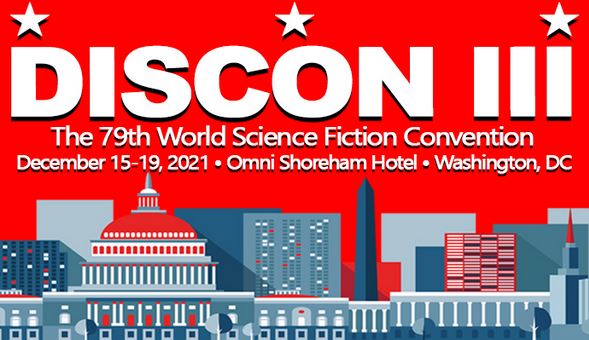|
The hotel deserved criticism. The layout of the historic Omni Shoreham, built in 1930 and added onto a few times, felt to me like an M. C. Escher etching with confusing stairways everywhere. On the second day of the convention, I took an organised tour to try to orient myself, and at one point the tour guide got lost. More importantly, although I’m fully mobile, even I could see how the building met the letter but not the spirit of accessibility. The tiny elevators especially caused problems as we tried to cope with social distancing. Many meeting rooms were too small, often with standing room only and no social distancing. In an area of the city with limited on-street parking, one level of the parking garage was used for the Exhibit Hall and Dealer’s Room.
As the convention was being planned, CoVID-19 vaccines were only available for adults, so there was no youth programming. Only 11 costumers participated in the Masquerade. However, other aspects of the convention took place: the Art Show, concerts and dances, filk, kaffeeklatsches, author signings and readings, science talks, online and in-person gaming, evening parties, and morning strolls with the stars, but no cinema or media track.
Discon attempted to have a hybrid in-person and virtual con, with Zoom, Discord, and Slack components. Panels were in-person, live on Zoom, or virtual with on-site viewing. The in-person events seemed more popular to the point of overcrowding, and watching a presentation on my hotel room on Zoom, while necessary and understandable, felt lonely.
Panels covered a wide scope of interests with flashes of wisdom. At the panel called What Makes a Classic, John Hertz said the choice required outside perspective: “Water wasn’t discovered by a fish.” Post-Pandemic Aesthetics, held without irony on Zoom, considered the “sheer stupidity” of ivermectin, and Charlie Stross lamented, “We’ve lost the culture of public health in the West.” During the panel on AI in Fiction and Reality, Benjamin C. Kinney zeroed in on an important reality: “The value of self-driving cars is all the data they gather.” At What’s Great About African SF, Wole Talabi summarised, “The only wrong portrayal of Africa is a simplistic one.” There were also science programme items.
Meanwhile, site selection was underway. An eight-day telethon-style Chinese campaign for pre-convention votes for the Chengdu bid brought in 1,905 ballots from China out of a total of 2,283 from all countries, so despite last-minute on-site voting, the results were unlikely to be a surprise. The WSFS Business Meeting on Friday, with a 47-36 vote, passed a non-binding advisory resolution stating that site selection ballots which did not include all required information should be counted as “no preference.” Most of the ballots from China used an email address in place of a street address, perhaps a cultural misunderstanding. The resolution added to the tension.
Because the advisory resolution was not applied to the vote, it did not change the outcome: 2006 votes for Chengdu, 807 for Winnipeg, and the rest either for no preference or scattered candidates. Chengdu’s Programme report Zero called for volunteers who are “experienced” Worldcon organisers, named some Guests of Honour who caused more controversy.
Despite some pre-convention controversies over the Hugo Awards nominees, the presentation Saturday evening came off without many issues, although it was delayed for an hour because a bad belt in an air conditioning unit led to a lot of smoke in the auditorium, but no fire. Notably, T. Kingfisher (aka Ursula Vernon), who won the Lodestar Award and Best Short Story Award, delivered two long but entertaining speeches about the wonders of slime mould.
The Hugo Afterparty, however, turned out to have Raytheon Intelligence and Space as a sponsor, which is part of the larger Raytheon Technologies, which manufactures advanced, controversial wartime weaponry. That sponsorship drew sharp objections. After the convention, chair Mary Robinette Kowal issued an apology and listed some corrective actions.
None of that could detract from the general joy during the closing ceremonies over the fact that the convention had occurred at all. Kowal presented the gavel to Helen Montgomery, chair of Chicon 8, the 80th Worldcon, which will be held in Chicago on 1st-5th September 2022. Chicon 8 promises to “take it to the stars” with a hybrid, multilingual convention — and with luck, perhaps not so scarred by CoVID.
Sue Burke
Sue Burke is an author and fan who lives in Chicago, USA. Her novels include Semiosis, Interference and Immunity Index. More information is at https://sueburke.site.
[Up: Convention Reviews Index | Home Page: Science Fact & Science Fiction Concatenation]
[Article Index | Recent Site Additions | Most recent Seasonal Science Fiction
News]
[Updated: 22.4.15 | Contact | Copyright | Privacy]
|



